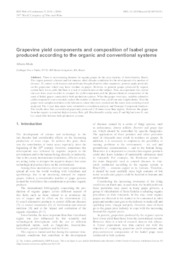Grapevine yield components and composition of Isabel grape produced according to the organic and conventional systems.
Grapevine yield components and composition of Isabel grape produced according to the organic and conventional systems.
Author(s): MIELE, A.
Summary: There is an increasing demand for organic grapes by the juice industry of Serra Gaucha, Brazil. This region presents a humid and hot summer, ideal climatic conditions for the development of a number of diseases. To control such diseases and problems brought about by other organisms, growers apply pesticides on the grapevines which may leave residues in grapes. However, in general, grapes produced by organic system have lower yield, but there is a lack of research data on this subject. Thus, an experiment was carried out over three years in order to compare the yield components and the physicochemical composition of the must of Isabel grapes conducted in both production systems. When the grapes were ripe, variables related to yield components were evaluated, such as the number of clusters/vine, yield/vine and weight/cluster. Then the grapes were sampled and taken to the laboratory where they were crushed and the musts were centrifuged and analyzed. The 3-year data mean were submitted to correlation analysis and Principal Component Analysis. The results show that conventional grapevines produced 2.18 times more than organic. However, the grapes from the organic system had higher density, Brix, pH, Brix/titratable acidity ratio, P and Mg but lower K, and Ca varied little between both production systems.
Publication year: 2016
Types of publication: Journal article
Unit: Embrapa Grape & Wine
Keywords: Diseases of plant, Doenca de planta, Fungi species, Uva, Uva Isabel
Observation
Some of Embrapa's publications are published as ePub files. To read them, use or download one of the following free software options to your computer or mobile device. Android: Google Play Books; IOS: iBooks; Windows and Linux: Calibre.
Access other publications
Access the Agricultural Research Database (BDPA) to consult Embrapa's full library collection and records.
Visit Embrapa Bookstore to purchase books and other publications sold by Embrapa.

